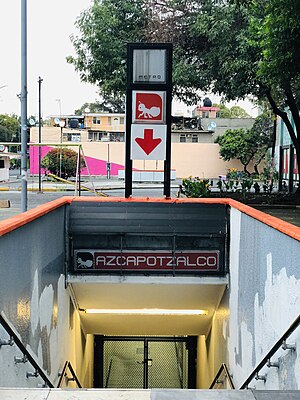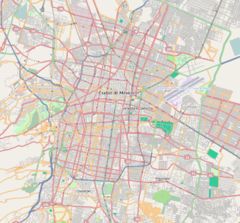UAM-Azcapotzalco metro station
| STC rapid transit | |||||||||||
 | |||||||||||
| General information | |||||||||||
| Location | Mexico City Mexico | ||||||||||
| Coordinates | 19°29′28″N 99°11′11″W / 19.490989°N 99.186416°W | ||||||||||
| Operated by | Sistema de Transporte Colectivo (STC) | ||||||||||
| Line(s) | |||||||||||
| Platforms | 2 side platforms | ||||||||||
| Tracks | 2 | ||||||||||
| Construction | |||||||||||
| Structure type | Underground | ||||||||||
| Other information | |||||||||||
| Status | In service | ||||||||||
| History | |||||||||||
| Opened | 21 December 1983 | ||||||||||
| Previous names | Azcapotzalco | ||||||||||
| Passengers | |||||||||||
| 2023 | 2,448,202[1] | ||||||||||
| Rank | 144/195[1] | ||||||||||
| Services | |||||||||||
| |||||||||||
| |||||||||||
UAM-Azcapotzalco (; formerly Azcapotzalco) is a metro station in northern Mexico City, located in the Azcapotzalco borough, along Line 6. In 2019, the station had an average ridership of 8,076 passengers per day.[2]
General information
[edit]Azcapotzalco was opened on 21 December 1983, as part of the first stretch of Line 6, going from El Rosario to Instituto del Petróleo.[3]
The station serves the Reynosa Tamaulipas, San Andrés and San Marcos neighborhoods. It is also close to Azcapotzalco's downtown and city hall as well as to the Universidad Autónoma Metropolitana Azcapotzalco campus.
Name and pictogram
[edit]The station was originally named Azcapotzalco. This was decided due to the fact that Metro Azcapotzalco was the closest station to downtown Azcapotzalco and to the municipality's city hall.[4]
The station's pictogram depict an ant because Azcapotzalco's ancient meaning literally translates to "in the place of the anthills".[4]
Ridership
[edit]| Annual passenger ridership | |||||
|---|---|---|---|---|---|
| Year | Ridership | Average daily | Rank | % change | Ref. |
| 2023 | 2,448,202 | 6,707 | 144/195 | +15.77% | [1] |
| 2022 | 2,114,779 | 5,793 | 151/195 | +46.86% | [1] |
| 2021 | 1,439,985 | 3,945 | 157/195 | −19.74% | [5] |
| 2020 | 1,794,159 | 4,902 | 157/195 | −39.14% | [6] |
| 2019 | 2,947,847 | 8,076 | 166/195 | +0.44% | [2] |
| 2018 | 2,935,018 | 8,041 | 165/195 | −1.20% | [7] |
| 2017 | 2,970,709 | 8,138 | 164/195 | −2.89% | [8] |
| 2016 | 3,058,994 | 8,357 | 161/195 | −3.39% | [9] |
| 2015 | 3,166,394 | 8,675 | 147/195 | +11.71% | [10] |
| 2014 | 2,834,420 | 7,765 | 157/195 | +7.75% | [11] |
References
[edit]- ^ a b c d "Afluencia de estación por línea 2023" [Station traffic per line 2023] (in Spanish). Sistema Transporte Colectivo Metro. 2024. Archived from the original on 27 January 2024. Retrieved 24 January 2024.
- ^ a b "Afluencia de estación por línea 2019" [Station traffic per line 2019] (in Spanish). Sistema Transporte Colectivo Metro. 2020. Archived from the original on 8 April 2020. Retrieved 3 May 2020.
- ^ Monroy, Marco. Schwandl, Robert (ed.). "Opening Dates for Mexico City's Subway". Retrieved 3 August 2011.
- ^ a b "Azcapotzalco" (in Spanish). Metro CDMX. Retrieved 5 April 2020.
- ^ "Afluencia de estación por línea 2021" [Station traffic per line 2021] (in Spanish). Sistema Transporte Colectivo Metro. 2020. Archived from the original on 7 March 2022. Retrieved 7 March 2022.
- ^ "Afluencia de estación por línea 2020" [Station traffic per line 2020] (in Spanish). Sistema Transporte Colectivo Metro. 2021. Archived from the original on 21 June 2021. Retrieved 21 June 2021.
- ^ "Afluencia de estación por línea 2018" [Station traffic per line 2018] (in Spanish). Sistema Transporte Colectivo Metro. 2019. Archived from the original on 6 June 2019. Retrieved 7 April 2020.
- ^ "Afluencia de estación por línea 2017" [Station traffic per line 2017] (in Spanish). Sistema Transporte Colectivo Metro. 2019. Archived from the original on 3 May 2020. Retrieved 3 May 2020.
- ^ "Afluencia de estación por línea 2016" [Station traffic per line 2016] (in Spanish). Sistema Transporte Colectivo Metro. 2017. Archived from the original on 3 May 2020. Retrieved 3 May 2020.
- ^ "Afluencia de estación por línea 2015" [Station traffic per line 2015] (in Spanish). Sistema Transporte Colectivo Metro. 2016. Archived from the original on 3 May 2020. Retrieved 6 May 2020.
- ^ "Afluencia de estación por línea 2014" [Station traffic per line 2014] (in Spanish). Sistema Transporte Colectivo Metro. 2015. Archived from the original on 3 May 2020. Retrieved 6 May 2020.
External links
[edit]


